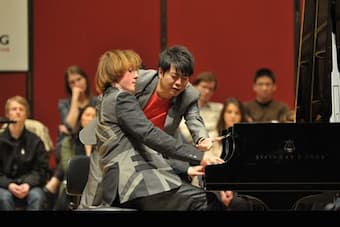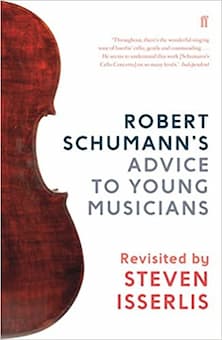by

Lang Lang masterclass
The title of this article is a quote from Robert Schumann’s ‘Advice to Young Musicians’, a cornucopia of practical advice and poetic words of wisdom for young people beginning their musical education, which still has plenty of relevance for musicians of all ages and abilities today.
When we see the word “master” in relation to music, most of us immediately think of the “masterclass”, the private lesson in public where participants submit their playing to the scrutiny of a “master teacher” such as Angela Hewitt or Maxim Vengerov. At one time, such classes were quite terrifying for the participants (I remember watching masterclasses with cellist Paul Tortelier on the TV in the 1970s and 80s and he seemed very fierce!), but in these more enlightened times, the masterclass, sometimes rebranded as “workshop”, has become a valuable forum for critique, support and advice, not only from the “master” but also from active listeners – something private lessons do not offer.
Watching a masterclass, especially with high-level players, is an opportunity to watch artists at work. It reveals what musicians do when they practice and often confirms the huge amounts of time and effort which go into refining music – something which is often forgotten when we see musicians performing. One of the most exciting aspects of the masterclass is witnessing breakthroughs and seeing how just a few words from an experienced master teacher can transform the participant’s playing. It’s an exciting and rewarding experience shared by both performers and observers.

Robert Schumann’s ‘Advice to Young Musicians’
© Amazon
In fact, I don’t believe Schumann was thinking of the masterclass as we know it today in his aphorism, but was actually referring to an attitude of mind which should colour one’s practicing and playing at all times. It is a fact universally acknowledged amongst musicians and music teachers that mindless practice is not only unproductive but also unmusical. But if we play “as if in the presence of a master”, we raise our game. In short, what Schumann is suggesting is that one should always play (and I include “practice” in the word “play”) with all one’s critical and artistic faculties fully alert – mindfully, deeply and beautifully. Repetitive practise is important, for sure, but it should be always be both thoughtful and repetitive – and each repetition should be considered and reflected upon. Taking notice of what one is playing – each phrase, dynamic nuance, subtleties of touch, expression, articulation – will result in more efficient and rewarding practice, leading to the kind of vibrant and authoritative playing one would be happy to present to a master teacher. In effect, one is putting into practice the habits of a master musician; this approach is relevant to from the beginner to the highly advanced player and is one we should carry with us at all times, from the practice room to the performance stage.
For me, Schumann’s comment also suggests one should not fear playing to a master. If you become accustomed to playing with that mindset, what is there to fear?
